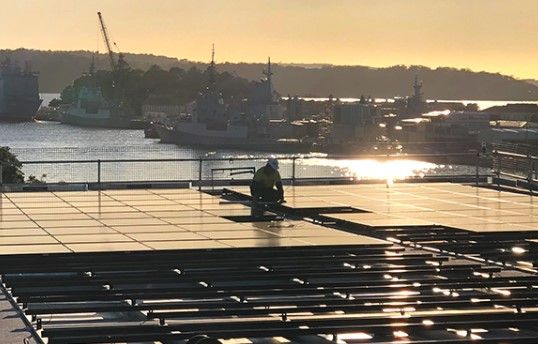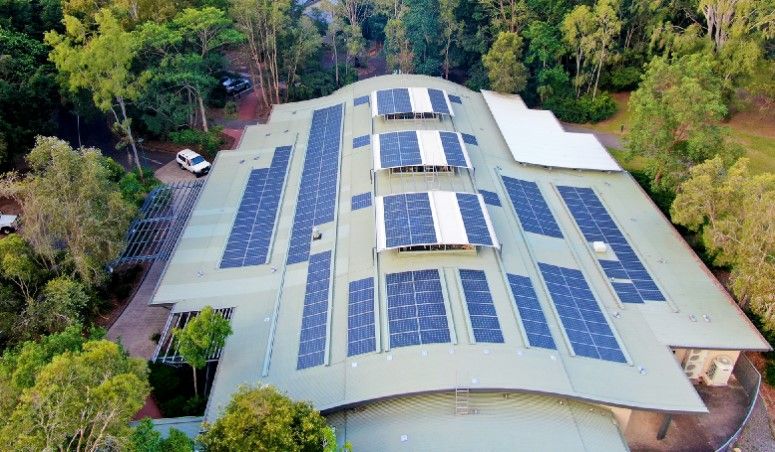
Your decision to install solar in your business makes sense for a number of reasons. First of all, it reduces your electricity bills and reduces operational costs. Second, it reduces your carbon footprint and makes your business more environmentally friendly. In addition, you'll be joining the ranks of companies that have switched to solar power, such as Amazon, Apple, and Microsoft. This will improve your brand's reputation and foster employee pride.
When you decide to go solar, you probably want to get the process done as quickly as possible to reap the benefits immediately. In order to help you manage your expectations, we provide information on the commercial solar installation process, including advantages of commercial solar systems, steps involved in installing solar project, factors that affect installation timelines, and financing options.
Business benefits of installing solar panels
Commercial solar systems have a number of advantages, from financial to environmental to reputational. If you're still unsure whether solar panels make good business sense, let's go over some of the advantages.
Cost savings
The installation of solar panels will reduce your operating costs by reducing the amount of electricity you buy from your local utility. This will result in lower electric bills, allowing you to grow your business more effectively.
Stability of finances
While we are on the topic of finances, solar energy can protect your business from fluctuating energy prices, thereby promoting financial stability. With rising energy costs, businesses everywhere are unable to predict their monthly energy expenses. By adding solar, businesses can lock-in a predictable, and reduced, monthly energy expense. You will continue to receive free energy production for the lifetime of your solar panels once you have completed your payback period.
Independence from fossil fuels
Investing in solar power storage, such as a solar battery, will protect your business from supply outages or grid failures. Solar power reduces your dependence on the grid and increases your energy independence. During an outage, when other businesses may need to close, you can continue many critical operations.
Carbon footprint reduction
Increasingly, consumers and employees expect businesses to take social and environmental responsibility into account. As we work collectively to mitigate climate change, businesses are also required to abide by increasing legal obligations and sustainability standards. It is possible for your business to meet the requirements while demonstrating a strong commitment to the larger global mission by investing in a commercial solar project.
A small solar panel system can help your business reduce carbon emissions and contribute to a greener future. You can then publicize your efforts through social media and literature to demonstrate your dedication to the environment.
Reputation improvement
The installation of solar panels for your business can improve the reputation of your brand, going back to the previous point. Installing solar panels can help you align your business as a forward-thinking, responsible company that is taking steps to improve the environment.
The installation of solar panels can also help you attract and retain employees. Research has shown that employees will not apply to a company unless its values are aligned with their own.
Incentive taxation
One of the most lucrative tax benefits is the 30% federal investment tax credit, which has been extended through 2032, which can offset the upfront costs of going solar.
You may even be eligible for additional savings depending on where your commercial project is installed and the materials you use. You can get a free, no-obligation quote and estimated ROI from our friendly team to learn more about tax incentives available to your organization.
Commercial solar installation steps
Installing solar panels and related equipment will vary depending on the size and type of solar energy system you're installing, the jurisdiction in which you operate, the structure and building you're using, and many other factors unique to your project once you've decided to add solar energy to your business. However, most commercial solar projects typically follow five basic steps, no matter which path you choose. Here is a detailed explanation of each step.
1. Site evaluation
The site evaluation process is the first step in the design and installation of your solar system. The site evaluation process involves:
Reviewing relevant legal documents to ensure you are eligible to build and install a solar energy system
Your solar energy system will be connected to the grid by determining where and how it will be installed
Assessing the site in a variety of ways, including shade analysis, structural evaluation, and topographical and geological surveys.
2. Designing the solar energy system
A solar provider will ask you about your specific solar energy goals and power needs following the site evaluation. This will allow them to design a system that meets your needs.
The system design phase begins with conceptual ideas that are formalized with a design drawing. This design outlines how the solar panels will be arranged to capture the greatest amount of sunlight from your site. There are various options for the design, such as rooftop-mounted, ground-mounted, and solar carports.
Once these designs have been approved, they will serve as blueprints for the construction of your commercial solar installation. This step can also involve outlining construction details and permit drawings.
3. Constructing the solar panel system
A solar panel system's construction time will be determined by its size and complexity. A small rooftop system can be completed within two or three weeks, whereas a larger, more complex system can take several months to complete. In order to keep you informed throughout the construction process, your solar installer will give you a detailed project outline and an estimated completion timeframe.
Your normal business operations will be minimally disrupted during the installation process by a good solar provider. The most experienced solar installers will work to minimize disruptions to your normal operations, so you should plan for minor disruptions, like finding alternate parking spots or planning for a short power outage. When installing a large system that requires months of construction, choosing a reputable and experienced commercial solar installer is vital.

4. Commissioning of the completed system
When construction is complete, the final step of solar installation is commissioning. A solar energy system will be carefully inspected by your solar provider to ensure it operates as designed and was built according to plan. After you have been granted permission to connect your solar energy system to the local power grid, you will be able to operate it.
5. Operation & maintenance of systems
The maintenance of your solar energy system is not technically part of the installation process, but it can help ensure maximum efficiency and extend its lifespan. A solar contract should specify the level of involvement of your business in operations and maintenance (O&M), including warranty repairs, performance monitoring, and routine inspections. Learn more
Choosing a solar provider with O&M is one of the key reasons why you should choose them. It is crucial to choose a solar design and installation team that has proven O&M resources, positive reviews, and a reputation for quality long-term support when choosing a solar design and installation team. In order to determine whether the company will be around for the life of your system, it's also important to consider how long they've been in business. Commercial solar energy systems that are orphaned are the most frustrating.